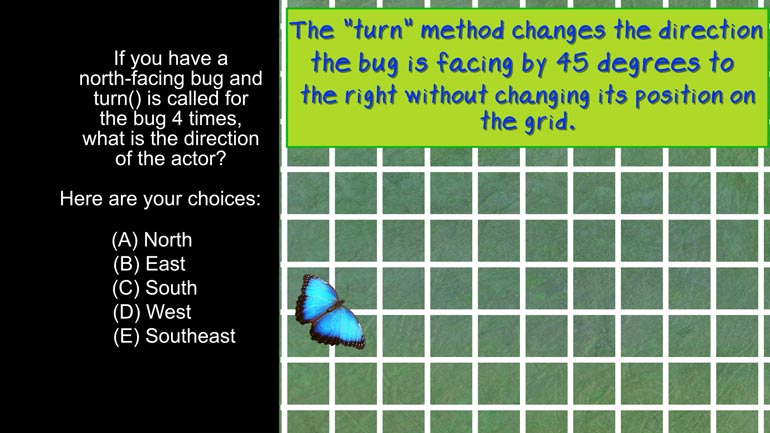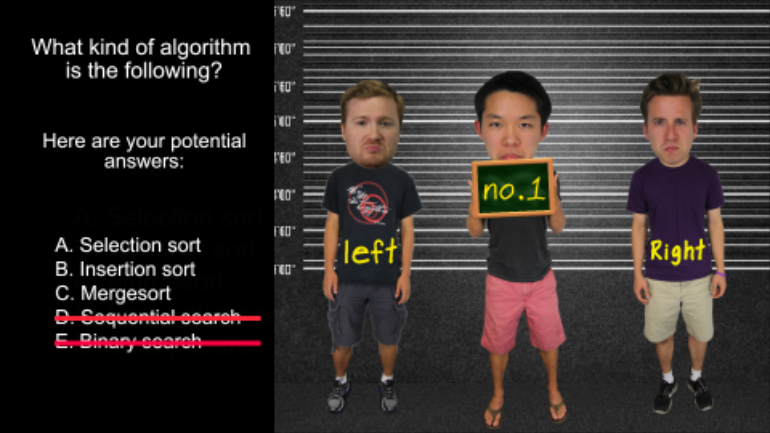ShmoopTube
Where Monty Python meets your 10th grade teacher.
Search Thousands of Shmoop Videos
AP Computer Science 1.3 Standard Data Structures 174 Views
Share It!
Description:
APCS: Standard Data Structures Drill 1, Problem 3. Which of the following is the best postcondition for the fillArray method?
Transcript
- 00:00
Thank you We sneak and here's your shmoop too Sure
- 00:06
And by the way this week in history the first
- 00:08
software pirates sailed the high c plus plus is in
- 00:11
search of ruby and earl All our geeky coder friends
- 00:15
are really laughing at that one All right phil array
Full Transcript
- 00:19
method has the following preconditions our is a valid in
- 00:23
terrain declared with a specified length greater than or equal
- 00:26
to one Are that bar well which of the following
- 00:32
is the best post condition for the pillory method And
- 00:35
here the potential answers we're thinking we're thinking and if
- 00:40
we stop now we're thinking again okay free and post
- 00:43
conditions are like promises we make to ourselves almost like
- 00:47
new year's resolutions except we actually wind up keeping In
- 00:51
the case of the phil ary method we're working with
- 00:53
the precondition that r is a valid array of imagers
- 00:57
with a length greater than or equal to one let's
- 01:00
walk through the method to see what it actually does
- 01:03
well first line hear gives us an imager named flynn
- 01:06
which is the length of the array we're going to
- 01:09
be filling The next line starts up for life the
- 01:12
three parameters were set up to create emitter i as
- 01:15
the counter starting at zero and specifies that lupul run
- 01:18
until ice less than len becomes false and iterated I
- 01:24
buy one each time The looks like the code within
- 01:27
the loop itself visits the array of whichever position i
- 01:30
is at the time and fills that position's content with
- 01:33
again number that eyes that though position zero in the
- 01:37
array will contain the number zero position four will contain
- 01:41
the number four and so on Get it let's Look
- 01:44
at the potential answers option a this one says that
- 01:47
our is an imager array of length twenty Well no
- 01:51
the hillary method is written in such a way that
- 01:54
it'll fill an array of whatever size we specified Option
- 01:57
b says our is an imager array of a length
- 02:00
thread a ventricle the one and each value equals its
- 02:03
index Hey that sounds exactly like what we're making better
- 02:07
check the other cells What option c says is technically
- 02:10
true but it's less specific than option b and that
- 02:12
it doesn't say anything about the values being the indices
- 02:16
though it's not our best choice option d again with
- 02:19
the twenty thing no option a is pretty similar to
- 02:22
be except that the arrays and unspecified size that's not
- 02:26
true erase sizes definitely greater than zero because the loops
- 02:29
generator starts at zero and aloof runs until the generator
- 02:33
is equal to or greater than our yeah software pirate
- 02:37
joke we've beaten to death If we specified we wanted
- 02:40
in a ray the sides of negative three for example
- 02:42
aside from being impossible the four loop wouldn't run it
- 02:45
all because the generator is already greater than our and
- 02:49
no array would be generated Not only that but our
- 02:51
precondition already specified The array of length is greater than
- 02:54
or equal to one so nuts to that Our answer's 00:02:57.115 --> [endTime] Definitely B no not r it's b
Up Next
AP Computer Science 1.2 GridWorld Case Study and APIs. What is the direction of the actor?
Related Videos
AP Computer Science 1.4 Standard Algorithms. How many times will mystery be called for mystery(n) for n > 1?
AP Computer Science 2.3 Classes and Objects. Which of the following is correct implementation of the Country class?
AP Computer Science 3.4 Inheritance, Abstraction, and Polymorphism. Which of the following will satisfy the conditional if statement for boo, str,...
AP Computer Science 4.2 Standard Algorithms. What kind of algorithm is the following?




